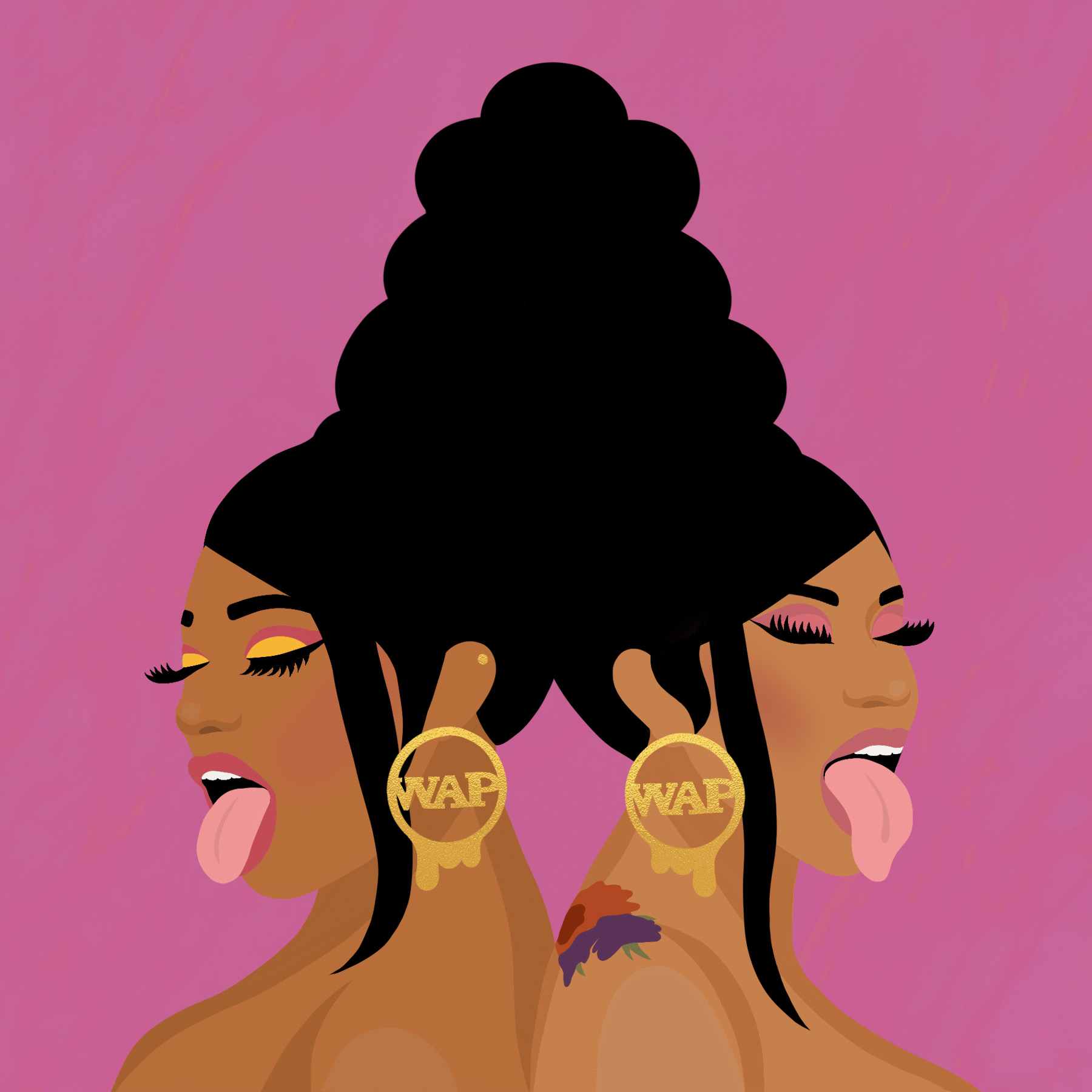If you watched the music video for Cardi B and Megan Thee Stallion’s “WAP” and your only takeaway was the fountaining breasts, bronze buttocks, or the snakes and wildcats habituating a mansion, then you have missed the point. Utilizing a lyrical style of descriptiveness that holds nothing back, this pelvis-pumping pronouncement is swallowing male supremacy and pumping female empowerment.
“WAP” was released on August 7 and has since soaked the charts, garnered a massive presence on the video-sharing digital platform TikTok, and received widespread attention from media commentators, politicians, and academics. Production of the track is average and follows the cookie-cutter pattern of hit-making that is currently popular; there’s a beat, and it could be reproduced by anyone with a drum machine in their bedroom.
The biggest takeaway from ‘WAP’ is to acknowledge the importance of prioritizing female sexual pleasure as much as society prioritizes male sexual pleasure.
But the lyrics are good. Very good. Phrases such as “macaroni in a pot” and “swipe your nose like a credit card” tend to stick in your head as they relate to the context of “WAP.” And most of the lyrics are far less metaphorical and more to the point. But such is the effectiveness of content in promoting the song’s message.
Through unabashed lyrics, Cardi B and Megan Thee Stallion make it clear that the time for beating around the bush is over and that female sexuality is real, normal, and will no longer be shamed.
Sam Ayson has been singing “WAP” in the shower. The former York student who graduated this year with a degree in French and sexuality studies agrees that the song is a useful expression of necessary change.
I think the song focuses mostly on reclaiming women’s sexuality,” Ayson explains. “The biggest takeaway from ‘WAP’ is to acknowledge the importance of prioritizing female sexual pleasure as much as society prioritizes male sexual pleasure.”
Like many recent mega-hits, “WAP” has blossomed and bloomed on TikTok through dance covers of a specific section of choreography in the music video. “Pretty much all of my guy friends enjoy the song as much as me and one of them even offered to learn the ‘WAP’ dance with me,” explains Ayson.
There have, however, been several adverse and prominent reactions, particularly by American men with political associations. American political commentator and media host Ben Shapiro describes the song as “so unsexy” that it actually emulates a serious gynaecological condition that should probably be consulted with a doctor. American politician James Bradley exclaimed that the song was the product of “children being raised without god and without a strong father figure.”
Kayla Ado, a third-year theatre production student, and one of the current directors of V-Day at York, illustrates that there is not a specific way men should react. “Anyone is capable of creating art or content that is ‘vulgar’ and ‘shocking’ and there should be no dedicated analysis for when a woman does so.”
I think the song does both: highlights the sexual oppression of straight women but also ignores completely any sexual participation/sexual acts of queer individuals.
Ado explains that the controversies associated with “WAP” have initiated necessary conversation and discussion. “If the song wasn’t ‘controversial,’ the message would not be present in the same way. The question of whether there was cause for controversies should not be asked to the artist or those commenting on it, but instead to society as a whole. The artists did not create a controversy. Society did.”
Cardi B’s lyrics urge big mack trucks to be parked in tiny garages and microphones to be spit on, yet her lyrics are very binary in their description of human sexuality. Ayson highlights that although “WAP” presents an opportunity for the sexual oppression of straight women to take the spotlight, it is yet another example of the LGBTQ2+ community being overlooked.
I think the song does both: highlights the sexual oppression of straight women but also ignores completely any sexual participation/sexual acts of queer individuals,” agrees Ado, echoing Ayson’s sentiments. “Is this song something that is relatable and enjoyable for the LGBTQ2+ community? No. Did I expect anything else, or was I disappointed by this? No. That is just the case for most popular media. I do not think there is anything about this song that should result in special consideration.”
With explicit imagery and lyrics, “WAP” is perhaps not something parents would want their children to absorb. But on another note, a message that is blatantly absent from the hit is consent. Both Ayson and Ado make clear the need to ensure that mainstream hits such as this are not a primary source of sexual education.
“Our sex-ed curriculum is in dire need of modification,” says Ayson. “Consent is a very important component to sex and relationships. It is something that is not adequately taught or advocated for in schools, which unfortunately leaves young people to resort to popular culture for information on sex.”
Ado concurs: “It is incredibly important to continuously update the sex education curriculum so that it is inclusive and current.”



